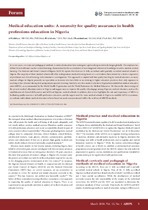Medical education units: A necessity for quality assurance in health professions education in Nigeria

View/
Date
2018Author
Adeola, Henry Ademola
Adefuye, AO
Bezuidenhout, J
Metadata
Show full item recordAbstract
In recent years, curricula and pedagogical methods in medical education have undergone rapid and unprecedented changes globally. The emphasis has
shifted from traditional, teacher-centred learning, characterised by the accumulation of non-integrated volumes of knowledge, to active, student-centred
learning. The Medical and Dental Council of Nigeria (MDCN) reports that there are 31 fully accredited and 6 partially accredited medical schools in
Nigeria. The majority of these medical schools still offer undergraduate medical training based on a curriculum characterised by a distinct separation
of preclinical and clinical training, with minimal or no integration. This approach is coupled with low-quality teaching by medical educators, as many
medical colleges in Nigeria presently use specialists as lecturers who have little or no training in higher education practices; their only exposure to
teaching is that obtained during their postgraduate specialty training. Similarly, very few medical schools in Nigeria have established medical education
units (MEUs), as recommended by the World Health Organization and the World Federation for Medical Education. We discuss the shortcomings of
the present medical education system in Nigeria and suggest ways to improve the quality of pedagogy among Nigerian medical educators, such as the
establishment of clinical-skills centres and MEUs at Nigerian medical schools. In addition, this review highlights the role and importance of MEUs in
facilitating quality assurance in health professions education, and the urgent need for more medical schools in Nigeria to establish MEUs to promote,
co-ordinate and evaluate medical education reforms based on needs assessments and within the confines of MDCN standards.
